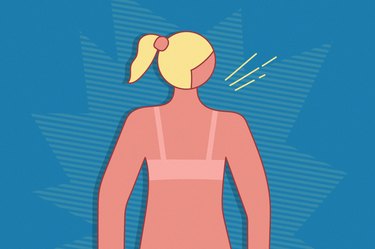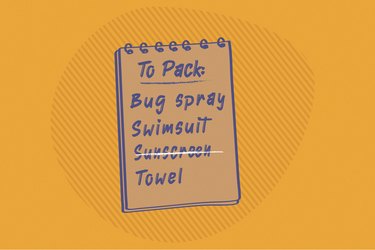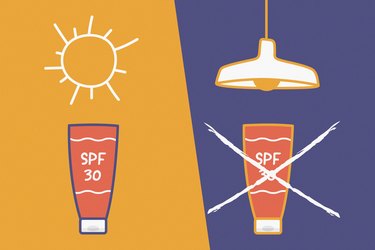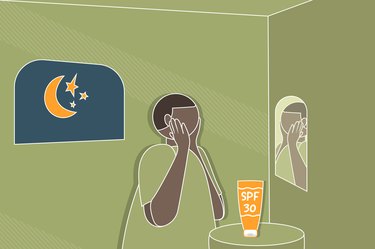
Picking at sunburned skin that's starting to peel can be weirdly satisfying. But while it may seem harmless, you're actually doing your skin a serious disservice.
Sunburn is skin damage caused by exposure to ultraviolet B (UVB) radiation from the sun. When you get a sunburn, the DNA of your damaged skin cells change. This damage can even be passed on to future skin cells — eventually causing skin to develop premature wrinkles, hyperpigmentation and an increased risk of skin cancer, according to the Centers for Disease Control and Prevention (CDC).
Video of the Day
Video of the Day
Exposure to UVB radiation also causes the outer layer of your skin to release inflammatory chemicals, causing skin to appear red and swollen. (Severe sunburns may even blister.)
After the swelling eases up, your skin tries to get rid of damaged cells by peeling or sloughing, says Erum Ilyas, MD, FAAD, a board-certified dermatologist with Schweiger Dermatology and adjunct professor of dermatology at Drexel University in Philadelphia.
Skin that's peeling from a sunburn will slough off completely when it's ready, Dr. Ilyas points out. Trying to peel it yourself, however, can cause further damage.
Effects of Peeling a Sunburn
If you do get a sunburn, you'll typically start to notice skin peeling within three to eight days after exposure, notes the CDC. (The exact timeframe — and how long sunburn lasts in general — depends on the severity of the burn.)
When that happens, you should resist the urge to pick and try to leave your skin alone. "The skin isn't always ready to be removed and may result in raw, bare areas and possible pinpoint bleeding," Dr. Ilyas says.
If you remove your skin too soon, it could send you right back into painful territory. Creating raw or open skin can also increase your risk of infection — especially if your sunburn was blistering — and can leave you with scars, Dr. Ilyas says.
How to Get Rid of Peeling Skin From a Sunburn
As much as you might want to pick at your skin, leaving it alone will help it shed more quickly.
"I recommend smothering the affected areas with petroleum jelly at night and even covering the areas with plastic wrap," Dr. Ilyas says. This helps trap moisture and soothe healing skin.
Note that you shouldn't do this too early in the healing process, though; thick ointments like petroleum jelly or other oil-based moisturizers tend to trap in heat and make sunburn worse, per the Skin Cancer Foundation.
If your skin still feels warm to the touch, try a natural remedy for sunburn like hydrating aloe vera or a light, oil-free moisturizer (take your pick from our list of the best after-sun products). Store it in the fridge for a cooling effect.
"Applying moisturizer will help serve as a protective barrier to help skin heal," Dr. Ilyas says.
If the loose edges of your peeling skin start to get annoying, it's OK to trim them back with a pair of clean cuticle scissors. "Just don't pull or tug on any of the adherent skin," she says.
How to Avoid Getting a Sunburn
Using proper skin protection and avoiding the sun's rays when they're at their strongest can help you avoid getting a sunburn in the first place. You should do the following, per Dr. Ilyas:
1. Wear Sunscreen and Reapply Regularly
Use a broad-spectrum sunscreen and reapply every two hours (or sooner if you're sweating or in the water). It's best to wear sunscreen on any day when the UV index is 3 or higher, Dr. Ilyas says. (This number is listed on most weather apps.)
2. Wear a Wide-Brimmed Hat and Protective Clothing
A lightweight long-sleeved shirt and pants will keep your skin covered. You can also wear a rash guard with UV protection to the pool or beach and wear a large, wide-brimmed hat to shield your face.
3. Stay Out of Direct Sun in the Middle of the Day
The sun's rays are strongest between 10 a.m. and 4 p.m, according to the U.S. Environmental Protection Agency (EPA). So if you are going to go outside at peak time, make sure you find some shade or wear some protective clothing like the ones mentioned above.
So, How Bad Is It Really to Peel a Sunburn?
Picking off a peeling sunburn can cause your sunburn to heal more slowly and increase the risk for an infection or scarring, so the best move is to leave it alone. If you find it annoying, trimming the edges (with sanitized scissors) without pulling on the skin is your best bet.
In short: "Just don't do it. Skin that's still adherent is not ready to come off," Dr. Ilyas says.
Is this an emergency? If you are experiencing serious medical symptoms, please see the National Library of Medicine’s list of signs you need emergency medical attention or call 911.



